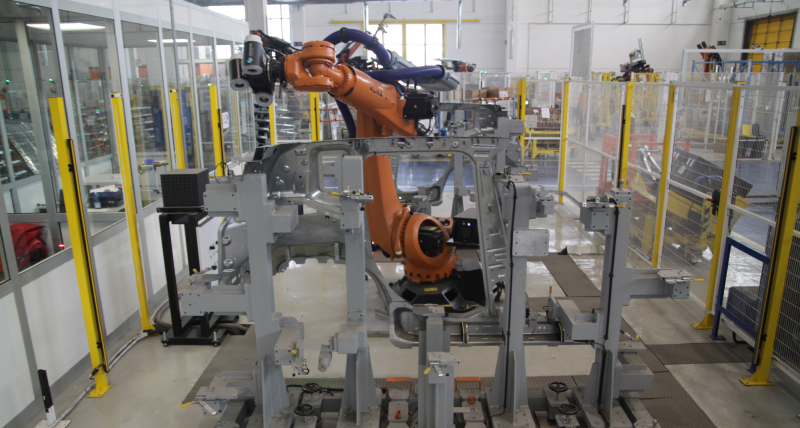Totally automated process control for automobile bodywork components
PMC Automotive - Italy
Contact us

Production cycle efficiency, strict compliance with delivery times, accurate quality control of process and product, focused and motivating management of human resources at all levels. These are just a few of the principles that govern the daily occurrences and ongoing evolution of activities at PMC Automotive, based in the industrial area that has grown up around one of the main Italian factories of the FCA (Fiat Chrysler Automobiles) group: Melfi.
PMC Automotive is the fruit of a joint venture between two important groups that specialise in supplying automotive industry components – Proma and Magnetto – both linked to the major automobile manufacturers of the world for many years.
Carlo Mandirola was the man responsible for developing, launching and calibrating the activities of the new factory:
“The recent restructuring and conversion of this manufacturing site has allowed us to introduce new production technologies, managerial processes and quality assurance systems, and to aim for top level efficiency and competitiveness aligned with modern WCM (World Class Manufacturing) logic. Our production focuses on a few of the important components of the vehicle body – specifically the side frames, the wheel arches and the load-bearing structure of the windshield on the two new vehicle models (Jeep Renegade and Fiat 500X) produced by FCA at the Melfi site. For these, we focused on the development of methods, systems and production logistics to achieve streamlined and lean production.”
The factory is highly automated in all the production phases with the greatest technological value. It is almost completely robotised, with machines performing repetitive tasks that require high repeatability to guarantee the necessary quality of performance.
“The new FCA business plan gave production volumes a big boost,” continues Mandirola, “And this has meant a radical change of methods; the modernisation of infrastructure and as a consequence, massive increases in production plants and production personnel, expansion of logistical areas and the optimisation of processes.
Quality assurance, both in terms of product and of process, is obviously an indispensable component in a modern enterprise like PMC. Today the Melfi factory is equipped with three Hexagon Metrology dimensional testing systems: a DEA gantry measurement machine, recently updated with PC-DMIS CAD++ measurement software, a DEA Vento horizontal arm and the latest acquisition, which just entered service, a WLS400A white light system installed on board a Kuka robot.
Carlo Mandirola explains: “From a qualitative point of view, the competitiveness of a company like ours is based on two key factors: the product quality and the process quality. The former represents the customer’s perception of value and their confidence in us; the latter makes us competitive in terms of effectiveness and efficiency. In these terms our latest Hexagon Metrology product, the WLS400A robotic white light system, will enable us to keep close and uninterrupted control of product and process quality, and guarantee the earliest possible intervention to prevent the occurrence of errors and defects.
Installed in the heart of the manufacturing plant, the Hexagon Metrology measurement cell consists of a white light scanner sensor mounted on a Kuka robot. The rapidity of the robot’s positioning, together with the sensor’s capacity to collect large quantities of 3D data points in just a few photo shots, makes it possible to obtain an accurate and comprehensive analysis of the component being measured, providing the elements necessary to assess the quality and stability of the process in real time. Output results include feature measurements and surface analyses in the form of colour maps and cross sections. The cell is equipped with two rotating turntables, each carrying a variety of workpiece fixtures, enabling it to operate on two different types of components for two different product lines.
PMC Automotive is the fruit of a joint venture between two important groups that specialise in supplying automotive industry components – Proma and Magnetto – both linked to the major automobile manufacturers of the world for many years.
A completely renovated factory
Carlo Mandirola was the man responsible for developing, launching and calibrating the activities of the new factory:“The recent restructuring and conversion of this manufacturing site has allowed us to introduce new production technologies, managerial processes and quality assurance systems, and to aim for top level efficiency and competitiveness aligned with modern WCM (World Class Manufacturing) logic. Our production focuses on a few of the important components of the vehicle body – specifically the side frames, the wheel arches and the load-bearing structure of the windshield on the two new vehicle models (Jeep Renegade and Fiat 500X) produced by FCA at the Melfi site. For these, we focused on the development of methods, systems and production logistics to achieve streamlined and lean production.”
The factory is highly automated in all the production phases with the greatest technological value. It is almost completely robotised, with machines performing repetitive tasks that require high repeatability to guarantee the necessary quality of performance.
Quality is indispensable
“The new FCA business plan gave production volumes a big boost,” continues Mandirola, “And this has meant a radical change of methods; the modernisation of infrastructure and as a consequence, massive increases in production plants and production personnel, expansion of logistical areas and the optimisation of processes.Quality assurance, both in terms of product and of process, is obviously an indispensable component in a modern enterprise like PMC. Today the Melfi factory is equipped with three Hexagon Metrology dimensional testing systems: a DEA gantry measurement machine, recently updated with PC-DMIS CAD++ measurement software, a DEA Vento horizontal arm and the latest acquisition, which just entered service, a WLS400A white light system installed on board a Kuka robot.
Carlo Mandirola explains: “From a qualitative point of view, the competitiveness of a company like ours is based on two key factors: the product quality and the process quality. The former represents the customer’s perception of value and their confidence in us; the latter makes us competitive in terms of effectiveness and efficiency. In these terms our latest Hexagon Metrology product, the WLS400A robotic white light system, will enable us to keep close and uninterrupted control of product and process quality, and guarantee the earliest possible intervention to prevent the occurrence of errors and defects.
